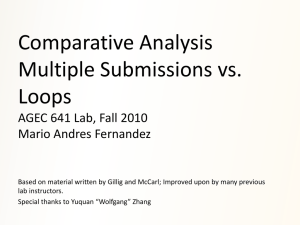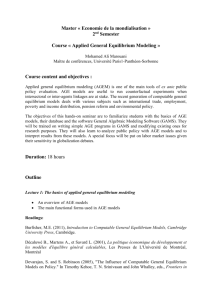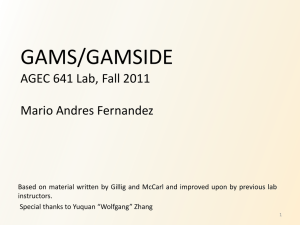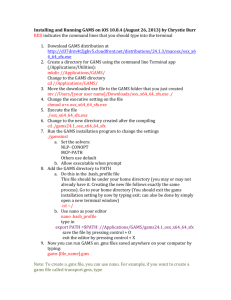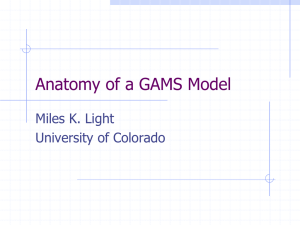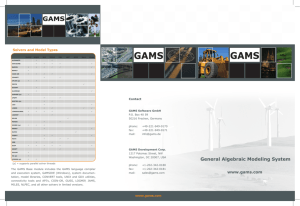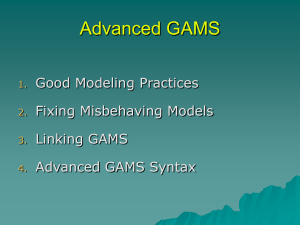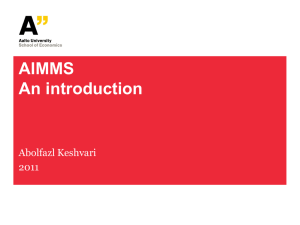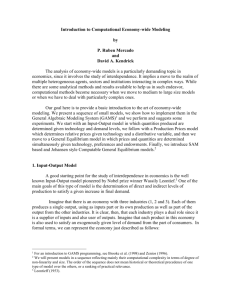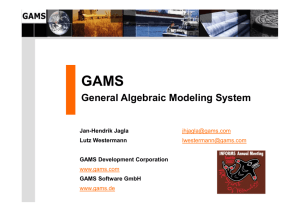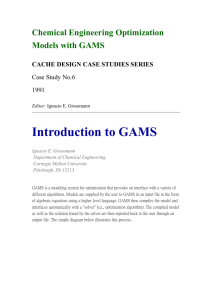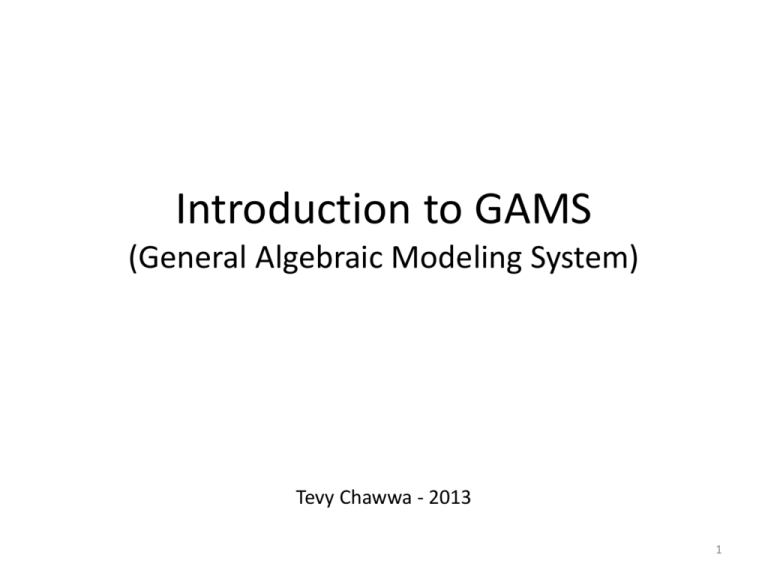
Introduction to GAMS
(General Algebraic Modeling System)
Tevy Chawwa - 2013
1
Download the GAMS
• Detailed Information in:
Tutorial GAMS :
– http://www.gams.com/dd/docs/gams/Tutorial.pdf
– http://www.gams.com/dd/docs/bigdocs/GAMSUsersGuide
.pdf
• Download the GAMS :
- Go to http://www.gams.com/
- You will find the latest version under : Download Current
GAMS System'.
- Choose the compatible version based on your computer
system (Windows 32 bit/64 bit, Mac, etc)
2
Installation
• Run the downloaded file for setup:
windows_x64_64(1)
• License file
– Choose ‘No’ when asked if you wish to copy a license file
3
Limitation
• Limitation of free demo version :
– Number of constraints and variables: 300
– Number of nonzero elements: 2000 (of which 1000 nonlinear)
– Number of discrete variables: 50 (including semi continuous,
semi integer and member of SOS-Sets)
– Additional Global solver limits: Number of constraints and
variables: 10
– The GAMS log will indicate that your system runs in demo
mode:
GAMS Rev 240 Copyright (C) 1987-2012 GAMS Development. All rights
reserved Licensee: GAMS Development Corporation, Washington, DC
G871201/0000CA-ANY Free Demo, 202-342-0180, sales@gams.com,
www.gams.com DC0000
– GAMS will terminate with a licensing error if you hit one of the
limits above:
*** Status: Terminated due to a licensing error
***
Inspect listing file for more information
4
Start GAMS
• File Project New project
• Specify the name of project and the folder : example1.gpr
• The GAMS window should now show the example1.gpr project window
5
Create New GAMS Code File
•
•
Select: File New
You should see the new file “Untitled_1.gms”
6
Open GAMS Code File
•
•
Select: File Open choose the .gms file
Example : fence. gms
7
Structure of GAMS Code
Inputs :
•
Sets
– Declaration
– Assignment of members
•
Data (Parameters, Tables, Scalars)
– Declaration
– Assignment of values
•
Output :
• Echo Print
• Reference Maps
• Equation Listings
• Status Reports
• Results
Variables
– Declaration
– Assignment of type
•
•
Assignment of bounds and/or initial values (optional)
Equations
– Declaration
– Definition
•
•
Model and Solve statements
Display statement (optional)
8
Some basic rules
1. Ordering of statements : an entity of the model cannot be
referenced before it is declared to exist.
2. GAMS statements may be laid out typographically in almost
any style that is appealing to the user :
– Multiple lines per statement, embedded blank lines, and multiple
statements per line are allowed
3. You should terminate every statement with a semicolon
4. The GAMS compiler does not distinguish between upperand lowercase letters, so you are free to use either.
5. Documentation is crucial to the usefulness of mathematical
models. There are 2 ways to do this :
– starts with an asterisk in column 1 is disregarded as a comment
line
– documentary text can be inserted within specific GAMS
statements
9
Some basic rules
6. The creation of GAMS entities involves two steps: a
declaration and an assignment or definition.
– Declaration: declaring the existence of something and giving it a
name.
– Assignment or definition : giving something a specific value or
form.
- In the case of equations, you must make the declaration
and definition in separate GAMS statements.
- For all other GAMS entities, however, you have the option
of making declarations and assignments in the same
statement or separately.
7. The names given to the entities of the model must start
with a letter and can be followed by up to thirty more
letters or digits.
10
Sets
Example 1 :
There are two goods I ={1,2}
We can write it as :
SET I Goods /1,2/ ;
Example 2:
• i = {Seattle, San Diego}
• j = {New York, Chicago, Topeka}
We can write it as:
Sets
i plants / seattle, san-diego /
j markets / new-york, chicago, topeka / ;
Or
set i plants / seattle, san-diego / ;
set j markets / new-york, chicago, topeka / ;
11
Sets
Example 3:
• t = {1991,1992,1993, ....., 2000}
• m = {mach1, mach2,......, mach24}.
We can write as :
• Set t time periods /1991*2000/;
• Set m machines /mach1*mach24/;
Note that set elements are stored as character strings, so the elements of t are not
numbers.
•
Another convenient feature is the alias statement, which is used to give another
name to a previously declared set. In the following example:
Alias (t,tp);
• the name tp is like a t’ in mathematical notation. It is useful in models that are
concerned with the interactions of elements within the same set.
12
Data
•
There are three formats of data: Lists, Table and Direct Assignments
1. Lists
Parameters
a(i) capacity of plant i in cases
/ seattle 350
san-diego 600 /
b(j) demand at market j in cases
/ new-york 325
chicago 300
topeka 275 / ;
Rules :
• the entire list must be enclosed in slashes
• the element-value pairs must be separated by commas or entered on separate lines.
• There is no semicolon separating the element-value list from the name, domain, and text that
precede it.
• Zero is the default value for all parameters.
• A scalar is regarded as a parameter that has no domain. It can be declared and assigned with a
Scalar
• statement containing a degenerate list of only one value, as in the following statement from the
• transportation model. Example :
Scalar f freight in dollars per case per thousand miles /90/;
13
Data
2. Table
table d(i,j) distance in thousands of miles
new-york
chicago
topeka
seattle
2.5
1.7
1.8
san-diego
2.5
1.8
1.4 ;
•
•
declare the parameter d and specify its domain as the set of ordered pairs in the
Cartesian product of i and j. The values of d are also given in this statement under
the appropriate heading.
If there are blank entries in the table, they are interpreted as zeroes.
14
Data
3. Direct Assignments
parameter c(i,j) transport cost in thousands of dollars
per case ;
c(i,j) = f * d(i,j) / 1000 ;
Other example :
Y Income
P(I) Prices of goods;
P(I)=1;
Y=100;
•
The same parameter can be assigned a value more than once. Each assignment
statement takes effect immediately and overrides any previous values
15
Variables
•
•
•
The decision variables (or endogenous variables ) of a GAMS-expressed
model must be declared with a Variables statement.
Each variable is given a name, a domain if appropriate, and (optionally)
text.
Examples :
VARIABLES
U
Utility level
P(I)
Prices
C(I)
Consumption levels;
Or
Variables
x(i,j) shipment quantities in cases
z total transportation costs in thousands of dollars ;
16
Equations
•
•
Equations must be declared and defined in separate statements.
Declaration :
Equations
cost
define objective function
supply(i) observe supply limit at plant i
demand(j) satisfy demand at market j ;
Definition
Component of definition :
1. The name of the equation being defined
2. The domain
3. Domain restriction condition (optional)
4. The symbol '..'
5. Left-hand-side expression
6. Relational operator: =l=, =e=, or =g=
(less than or equal to, equal to, greater than or equal to)
7. Right-hand-side expression
17
Equations
Example 1:
cost .. z =e= sum((i,j), c(i,j)*x(i,j)) ;
supply(i) .. sum(j, x(i,j)) =l= a(i) ;
demand(j) .. sum(i, x(i,j)) =g= b(j) ;
Example 2:
UTILITY..U=E=ALPHA*PROD(I, C(I)**BETA(I));
DEMAND(I)..C(I)=E=BETA(I)*Y/P(I);
Remember :
• The '=' symbol is used only in direct assignments, and the '=e=' symbol is used only
in equation definitions.
18
Values for variables and equations
•
•
GAMS was designed with a small database system in which records are maintained
for the variables and equations.
The most important fields in each record are:
.lo lower bound
.l level or primal value
.up upper bound
.m marginal or dual value
• Example : initial value of variables :
U.L=UO;
C.L(I)=CO(I);
C.LO(I)=0;
19
Model and Solve Statements
•
•
•
Model means collection of equations
If all previously dened equations are to be included you can enter /all/ in place of
the explicit list.
model transport /all/ ;
If we were to use some equations only :
model transport / cost, supply / ;
The domains are omitted from the list since they are not part of the equation name
•
Once a model has been declared and assigned equations, we are ready to call the
solver. This is done with a solve statement, which in our example is written as
solve transport using lp minimizing z ;
20
Model and Solve Statements
The format of the solve statement is as follows:
1. The key word solve
2. The name of the model to be solved
3. The key word using
4. An available solution procedure. The complete list is
–
–
–
–
–
–
–
–
–
–
–
–
–
lp for linear programming
qcp for quadratic constraint programming
nlp for nonlinear programming
dnlp for nonlinear programming with discontinuous derivatives
mip for mixed integer programming
rmip for relaxed mixed integer programming
miqcp for mixed integer quadratic constraint programming
minlp for mixed integer nonlinear programming
rmiqcp for relaxed mixed integer quadratic constraint programming
rminlp for relaxed mixed integer nonlinear programming
mcp for mixed complementarity problems
mpec for mathematical programs with equilibrium constraints
cns for constrained nonlinear systems
5. The keyword 'minimizing' or 'maximizing'
6. The name of the variable to be optimized
21
Display
• We can request a display of the results from
GAMS.
Display U,P ;
22
Run the Model
•
Select: File Run, or Press the red arrow
button
23
Output
•
•
•
•
•
•
•
Echo prints : copy, of your input file
Error messages :
These messages always start with **** and contain a '$' directly below the point
at which the compiler thinks the error occurred. The $ is followed by a numerical
error code, which is explained after the echo print.
Reference Maps : pair of reference maps that contain summaries and analyses of
the input le for the purposes of debugging and documentation.
Equation Listings
Model Statistics : number of equations, variables etc
Status Reports
The desired solver status is 1 NORMAL COMPLETION
Model status can be : 1. OPTIMAL, 2. LOCALLY OPTIMAL (For NLP),
3. UNBOUNDED, 4 INFEASIBLE
Solution Reports
24
Simple Example of Problem : Fence
*This is a program called garden.
*We have 16 feet of fencing.
*Our garden is initially 1 foot by 7 feet.
*We want to find the dimensions that maximize area of the
garden.
*create names for parameters
PARAMETERS
A0 Initial area
L0 Initial length
W0 Initial width;
*Assign values to the parameters
W0=1;
L0=7;
A0=7;
25
*Create names for variables
VARIABLES
A Area
L Length
W Width;
*Create names for equations
Equations
Area,
Fence;
* Assign the expressions to the equation names
Area..A=E=L*W;
Fence..2*L+2*W=E=16;
*Assign initial values to variables
L.L=L0;
W.L=W0;
A.L=A0;
Model GARDEN/ALL/;
SOLVE GARDEN USING NLP MAXIMIZING A;
display L.L, W.L, A.L;
26
GAMS Model Results
•
“No active process” window
27
•
“fence.lst” window
28
Solution
**** REPORT SUMMARY :
0
NONOPT
0 INFEASIBLE
0 UNBOUNDED
0
ERRORS
WEX-WEI 24.0.1 x86_64/MS Windows
GAMS Rev 240
Page 6
G e n e r a l
A l g e b r a i c
E x e c u t i o n
----
44 VARIABLE L.L
VARIABLE W.L
VARIABLE A.L
EXECUTION TIME
2012
=
01/10/13 23:16:08
M o d e l i n g
=
=
=
0.063 SECONDS
S y s t e m
4.000
4.000
16.000
2 Mb
Length
Width
Area
WEX240-240 Dec 18,
29

